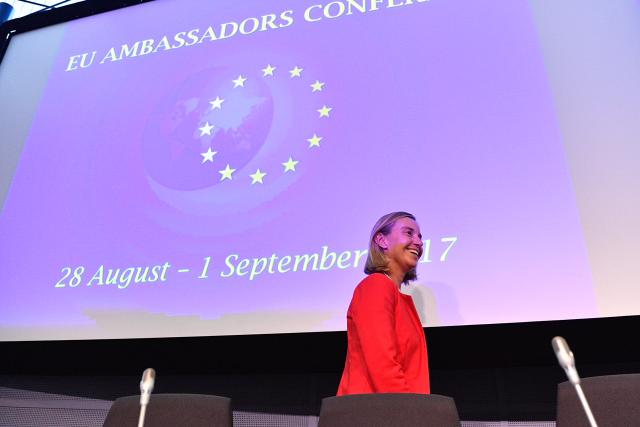We bear a great responsibility, and have an important opportunity to show the immense potential of our European Union – as an indispensable power for peace and security, as a force for good for our citizens and for the world, High Representative Federica Mogherini tells EU Ambassadors.
In the last year, the demand for an engaged European Union in global affairs has increased exponentially and the EU is responding accordingly, EU High Representative Mogherini today told Ambassadors from the EU’s 140 diplomatic representations around the world at their annual gathering in Brussels.
“The more chaotic world politics become, the stronger the need for a reliable, credible and predictable global power,” said Mogherini. The ‘European way’ of foreign policy – also characterised by working in partnership and engaging for the long-term – has become “even more attractive for many, inside and outside Europe.”
“There is no contradiction between being effective and being predictable,” said the High Representative. This approach has paid off in the EU’s work from Afghanistan to the Middle East Peace Process. When it comes to the Iran nuclear deal, Mogherini stressed that: “We will not change our mind on this; our partners know where we stand and what our strategic objectives are.” The EU’s approach and experience on Iran may also provide helpful to deal with the current tensions in Northeast Asia, where the EU has pressed for a multilateral solution, based on the clear understanding that “there is no military solution to this kind of tensions”.
A focus on cooperation, partnerships and multilateralism is also a hallmark of the Union’s approach. “We Europeans will always pivot around the multilateral institutions, we will always try to build cooperative solutions in the framework of the United Nations,” said Mogherini. This is not a static approach, with alliances changing over time and from file to file “in our ever-changing and multi-polar world”, but a strategic choice to advance our priorities. “When we work to build a global alliance in defence of the Paris agreement on climate; when we work for a free and fair trade; when we work for the respect of international norms, from Ukraine to the Korean peninsula – in all these cases, we are working for a safer Europe and a safer world.”
The EU also aims to ensure a long-term, integrated approach. From Iraq to Colombia to Syria, the EU is focused on supporting peace-building, post-conflict reconciliation and building strong societies. In Iraq the EU’s has worked to stabilise the areas liberated from Daesh, and “we are now planning an advisory mission to accompany the country in this challenging new phase”. In Syria, “we understand power politics” but our approach to discussing the future of Syria is “together with Syrian civil society – because the future of the country belongs to Syrians.” In Colombia “our Trust Fund in support of peace was ready to be launched as soon as the deal with the FARC was announced”. While the EU is increasingly a hard-security actor, it complements these activities with engagement: As part of efforts to counter terrorism, “we have opened new channels to engage with young people from all around our region: we are listening to their aspirations, and trying to address their concerns,” said Mogherini. Similarly, a new External Investment Plan reinforces EU efforts to stabilise the most fragile areas of Africa and the Mediterranean.
The demand for the EU’s engagement comes from its partners around the world, but also directly from our citizens. “Today, European citizens know that foreign policy matters to them, and to their everyday life”, pointed out the High Representative. “Most people understand that peace in Ukraine or in the Middle East matters. A trade deal or a non-proliferation agreement can change the life of millions on our continent.” The role of the EEAS and the EU’s 140 Delegations, to implement the EU’s Global Strategy; to build partnerships and alliances; to promote dialogue and understanding; to mediate conflicts and promote security; to negotiate agreements; to deliver programmes and projects that generate jobs, that support civil society and media, that build institutional capacity; and more – is therefore more important than ever.




